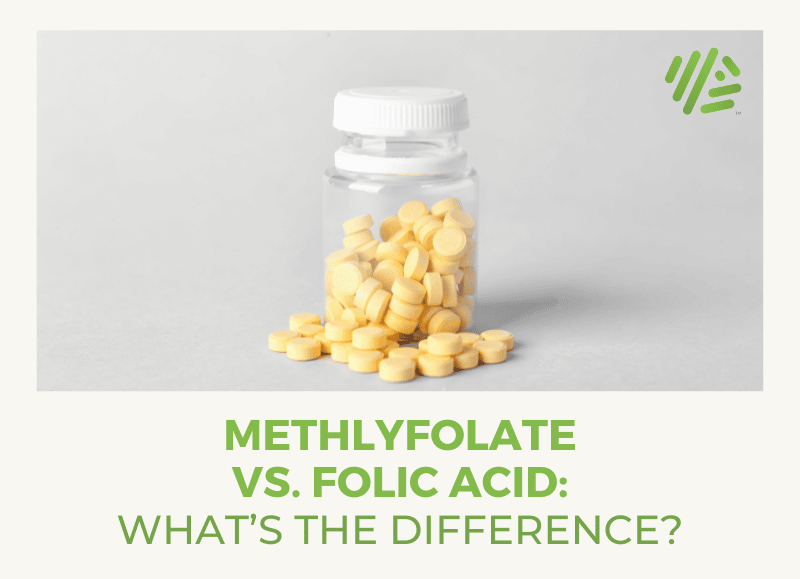Is Gary Brecka Right About Folic Acid?
Article at a Glance
- Folate is the natural form of vitamin B9, found in food.
- Folic acid is the synthetic form of folate, often used in fortified foods, and some supplements.
- Health influencer Gary Brecka is right about the difficulty some of us have converting folic acid to methylfolate, but he may be overstating the health impact. There isn’t strong evidence linking folic acid to ADHD, OCD, and other mental health disorders as Brecka claims.
Genes Mentioned

Contents
One of the big messages from Gary Brecka is be cautious about foods fortified with folic acid because not all of us can process this synthetic B9 properly. Brecka has blamed an excess of folic acid in the food supply with several mental health issues, including ADHD, OCD, and anxiety.
Is there evidence to support these claims?
In this post, we will break down whether that is a message worth following, or whether it’s overhyped, but first some folate basics.
Folate, methylfolate, and folic acid are all different forms of vitamin B9, but their bioavailability can differ significantly between people.
Folate is the natural form of vitamin B9.
By natural, I mean that it’s found in several types of foods.
You can get folate from foods like leafy green vegetables and citrus fruits, but it may become challenging to rely on diet alone to get the right amount needed for you and your growing baby.
This is why supplementing with folic acid is strongly recommended, not only during pregnancy but months before conception.
Methlyfolate is the bioactive form of folate
For your body to utilize the folate found in your kale salad, it must first be converted into methylfolate. Methylfolate is the active form of folate that 100% of people can fully absorb.
Methylfolate is also a synthetic form of folate, however, it is already broken down/converted into its bioavailable form and is sometimes recommended for those who cannot break down folic acid efficiently due to relatively common variants in the MTHFR gene.
Methylfolate Synonyms:
- 5-MTHF
- L-5-MTHF
- L-methylfolate
- L-methylfolate calcium (only if it’s bound to calcium salt)
- Methylfolate
- Levomefolic acid
The “L” in some of the above names indicates that it can be absorbed. If you see “6(S)” instead of “L”, it can also be absorbed. If the “L” is replaced with “6(R),” then the formulation is probably not particularly well absorbed and you should avoid it.
Folic Acid is the synthetic form of folate
Folic acid is the synthetic form of folate and is found in most leading prenatal vitamin brands, as well as fortified foods. Health influencer Gary Brecka has been sounding the alarm on how those with common MTHFR mutations may run into issues when eating a diet high in foods fortified with folic acid.
Although he is overstating the impact, he does have a point.
Unfortunately, 50% of women cannot fully absorb folic acid because they possess an MTHFR gene mutation that prevents conversion from folate into 5-MTHF. It is important to understand that even those of us with variants in our B vitamin metabolism genes can metabolize and absorb some folic acid, which is why the CDC still recommends a folic acid supplement during pregnancy regardless of SNPs.
However, a study published in the British Journal of Pharmacology compared the body’s absorption of 6(S)-5-MTHF to folic acid in healthy women who had MTHFR mutations. The study found that 6(S)-5-MTHF was far superior at increasing vitamin B9 levels in the blood plasma.1
That’s why advanced prenatal vitamins with methylfolate can be important; they ensure moms can successfully provide this crucial nutrient to their developing babies. Brecka’s arguments about unmetabolized folic acid are his are strongest – this is a real issue for many of us.
Breaking down Brecka’s folic acid position
A significant percentage of the population cannot convert folic acid into its bioactive form methyltetrahydrofolate (MTHF) as effectively as others.
For example, homozygous carriers of MTHFR C677T (rs1801133) are thought to have a 70% reduction in enzyme activity.
These variants are surprisingly common. It has been estimated that in America, about 25% of Hispanics and 10-15% of Caucasians have two copies of C677T variant.
And yet, because folic acid has been shown to reduce neural tube defects in newborns, the stuff was added to all our food in high amounts.
While higher doses of folic acid seem to benefit pregnant mothers, most supplements marketed to the general population contain mega-doses that exceed the recommended daily intake.
Those taking folic acid supplements in the Framingham cohort were 2.3-fold more likely to have high circulating UMFA than those who didn’t supplement.
One study found that un-metabolized folic acid was detected in 78% of fasting plasma samples from healthy participants who were not taking folic acid supplements.
What do we do with this information?
At the end of the day, there isn’t a smoking gun showing bad health outcomes, which is why Gary Brecka’s folic acid messaging is hyperbolic. Brecka is taking strong established science and overselling it, which is common in the functional medicine world when it comes to MTHFR. We aren’t aware of any research linking folic acid alone to ADHD, bipolar, OCD and manic-depression, all claims made by Brecka. Further, even folic acid has been shown to reduce neural tube defects in babies and that needs to be made clear to everyone looking at this information.
Brecka is directionally correct that understanding how you metabolize folate and folic acid is something to be aware of if you’re interested in a personalized approach to nutrition.
See also: What is the health impact of the MTHFR gene?
How to ensure you don’t get too much or too little folate
Firstly, read the labels on your multivitamins – do they contain too much folic acid?
Most adults should get about 0.5mg of folic acid per day, so use this as a guideline.
To Gary Brecka’s point – read the labels on your bread and cereals, too.
The U.S. National Institutes of Health’s Office of Dietary Supplements has set a recommended daily upper limit of 1mg for folic acid that comes from fortified grains and supplements (i.e. bread and cereals).5 They have not set a limit for folate that comes from vegetables or 5-MTHF supplements.
Can you take methylfolate and folic acid at the same time?
Folate is an essential nutrient, however, it is possible to have “too much of a good thing.”
Taking both forms of B9 at the same time could cause an excess of folate. If you’re taking a 5-MTHF supplement, then reduce the folic acid from fortified foods to a minimum and avoid multivitamins containing folic acid.
According to the Harvard Health Letter, the total amount of folic acid from grains can add up quickly. I have included their list below.
Common Foods Fortified with Folic Acid:
- Bowl of Special K Cereal: 0.394mg
- Serving of pretzels: 0.172mg
- 1 cup of cooked spaghetti: 0.166mg
- 1 multivitamin: 0.4mg
Total = 1.132mg
As you can see, it’s easy to reach that upper limit of folate in one day, so be mindful of your grain and vitamin intake, especially if you have an MTHFR mutation.
You also want to make sure you’re getting enough B12 and that your body is using it.



